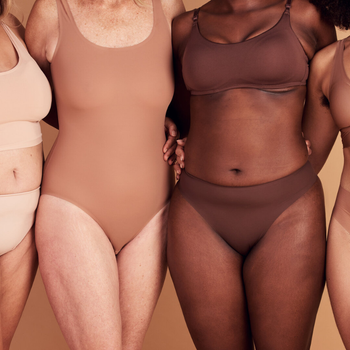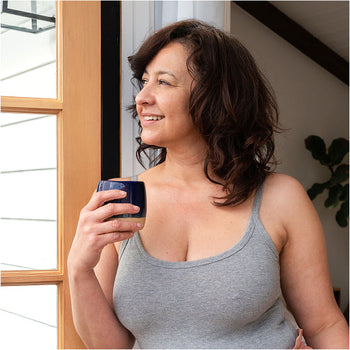I was twenty-six years old when my life started to change. A few years outside of my teenage years, the time when most girls are getting their menstrual cycles and learning how to manage them, I was entering a “more mature” phase of life. In your twenties, you’re supposed to be exploring your sexuality and planning for the children you’ll bear one day. Instead, my twenties consisted of hormone treatments for stage 5 endometriosis and undergoing a full hysterectomy.
My first phase of what I’ll call “menstruation maturity” was figuring out why my cycles were so painful and irregular. For a while, I chalked it up to stress, raging hormones, and a fast-paced lifestyle. I shared my stories with my girlfriends, who then shared their identical stories with me. Every woman menstruates differently. It wasn’t abnormal to hear about some cycles lasting two days while others lasted for ten or a slight period of discomfort compared to cramps from hell. I self-diagnosed and dealt with it because some of my cycles were more manageable than others. I was a woman dealing with the gift and curse of womanhood.
When things started to get more unmanageable, I found myself having “the talk” with my mother, almost as if I was a teenager learning about her body and its reproductive system all over again. It was then that I learned about my hereditary predisposition to endometriosis. As it turns out, my mother and my grandmother both suffered from the same condition. What I thought was the menstrual cycle that caused me such physical agony was actually a disorder that would affect me for the rest of my life.
Dealing with it wasn’t as easy as I’d hoped it would be. Stage 5 endometriosis isn’t something that can be managed with an over-the-counter PMS drug and a heating pad. Hormone treatments were supposed to keep it at bay. Maybe the treatments did help slightly, but not without a huge sacrifice and reminder that my life was changing forever. Before I turned thirty, I underwent a hysterectomy and was fully aware of the perils of menopause.
My sexual drive began to diminish, but of course, my attraction to men did not. There was nothing better than knowing I was interested in a guy and that we’d potentially have passionate sex. There was nothing worse than not being able to enjoy the sexual experience or perform at all because of vaginal dryness. To this day, it seems like no matter how stimulated I am, my vagina refuses to cooperate. The lubricants are a hassle and they often work against me. Condoms that promote the “thin as skin” and “intense pleasure” features don’t do anything for me. Masturbation doesn’t lead to a happy ending. I’ve learned to be extremely visually imaginative and sync my body with my passionate thoughts. It doesn’t replace the “real thing” at all, but it lets me feel alive and in charge of my sexual exploration. Sometimes that’s all a woman needs.
As much as I want to say that vaginal dryness is the most irritating part of menopause, there’s something that I can’t keep to myself as much as what goes (or doesn’t go on) inside of my panties. Have you ever been in your car, stuck in traffic, on a scorching day in August, with no AC? That’s what a hot flash is like—except add in the fact that you don’t want anyone to see how insanely hot you are. Hot flashes, of course, occur at the most inconvenient times. And while you’re trying to convince everyone else that the temperature in the room has suddenly spiked to 150 degrees Fahrenheit, the truth is it’s a PSA that you’re going through “the change”. To accommodate my fever pitches, I dress in layers as often as possible. While others think I’m being fashionable, I’m preparing for the moment when my hormones are basically demanding my full nudity in order to keep cool.
Menopause, regardless of the age you experience it, is mentally and physically demanding. You may feel like so many aspects of your life have come to a full stop. However, menopause isn’t a death sentence or a challenge to your womanhood. I’m definitely not saying that it’s easy to manage, but it’s a phase of life. Like all women, we all enter the beginning and end phases of menstruation at different times. The trick isn’t figuring out the timing or “beating” mother nature. It’s about adjusting your rhythm to mother nature and figuring out how to regain some level of control over your womanhood in any way possible.
NOTICE: KINDRA DOES NOT PROVIDE MEDICAL OR HEALTH CARE ADVICE. OUR EMPLOYEES AND OTHER REPRESENTATIVES ARE NOT PHYSICIANS OR HEALTH CARE CLINICIANS. YOU SHOULD CONSULT YOUR PERSONAL PHYSICIAN FOR ANY MEDICAL AND/OR OTHER HEALTH CARE ADVICE BEFORE ACTING ON ANY INFORMATION PROVIDED BY KINDRA OR ANY OTHER SOURCE.
Leave a Reply
Tags: About Menopause Anxious body Connection Dry Skin Foggy & Unfocused Hair Loss Hot flashes Low Sex Drive Managing my Hormones Mental Well-Being mind personal stories Physical Well-Being Sad Stressed Trouble Sleeping Vaginal Dryness Weight Gain













